El Camino: A Breaking Bad Movie is a love letter to Jesse Pinkman, but in the Breaking Bad universe—and especially in Jesse’s life—love does not exist without pain. The film gives us just a taste of the pain that he endured between the events of “Granite State” and the series finale, “Felina,” and I think this was the most important thing that the film offered to the loyal Breaking Bad viewer. For me, the exploration of that time period answered the question of whether we really needed a Breaking Bad movie. I wanted it, of course, but I didn’t think it was necessary. Now, having seen it, El Camino is an absolutely essential piece of the story as a whole.
The series skipped over much of Jesse’s captivity but we, as an audience, knew how deeply he was suffering. But what El Camino did was show us that no, we actually didn’t know. We thought we knew, but we had no idea how bad it really was. In hindsight, it didn’t even remotely do justice to Jesse’s character to leave out this traumatic chunk of time. As we see from the early scenes in El Camino, Jesse is suffering from PTSD due to his extended period of enslavement by the Nazis. We see physical evidence of torture and abuse as well as his obvious mental disturbance. Not only do we follow Jesse’s POV as he experiences this, we are given the perspective of Badger and Skinny Pete: the only two people in the world that Jesse would trust to have his back after his highly publicized escape.
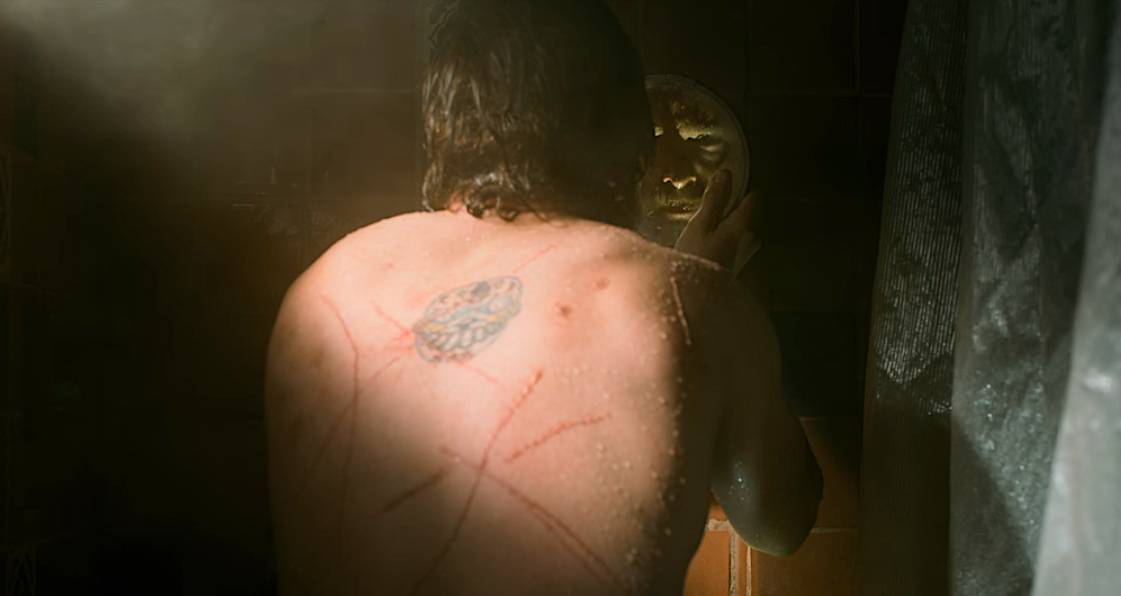
The Badger and Skinny dynamic has always been used for comic relief in order to break up the tension in Breaking Bad, and El Camino gives us a bit of that comedy, too. But what I found incredibly surprising was how the movie allowed them to be more than just the jokesters. Badger and Skinny are truly disturbed by what has happened to Jesse and the state he is currently in. They are willing to do anything they possibly can to help him escape. When an attempt to ditch the El Camino via Joe the scrapyard owner goes South after the LoJack is activated, it is—of all people—Skinny whose quick thinking actually yields a plan that works. It involves giving Jesse all the cash they’ve got and doing a bunch of car trading: Badger making a trip to the Mexico border in Skinny’s T-Bird, Skinny keeping the El Camino, and Jesse taking Badger’s Fiero to do whatever it is he needs to do to get out of town. When Jesse asks Skinny why he’s doing everything that he’s doing—the cops are certain to be there within minutes tracking the El Camino—he answers simply, “Dude, you’re my hero and shit.”
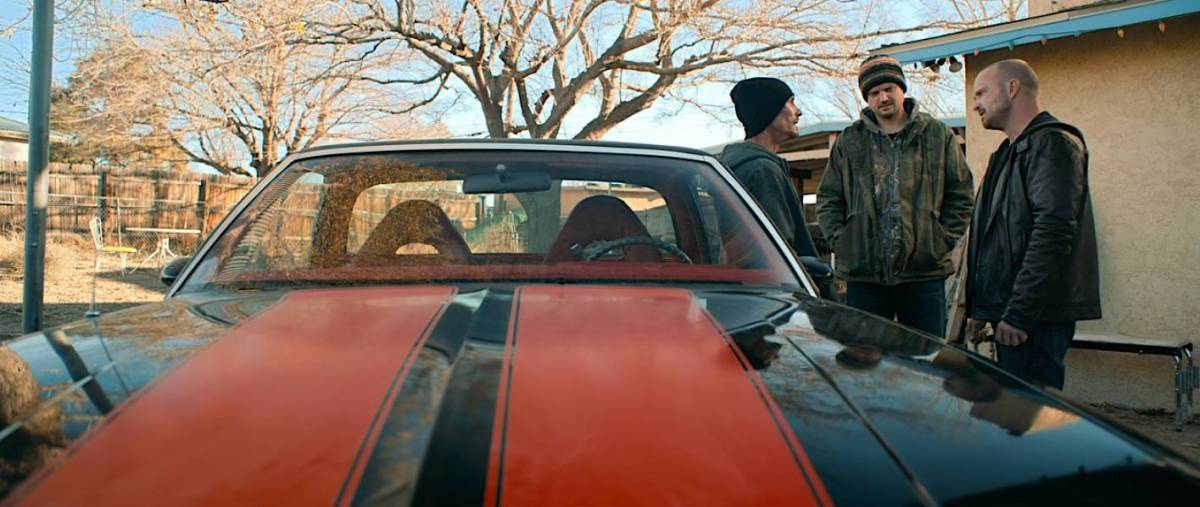
I didn’t expect to be truly touched by Badger and Skinny Pete within the first 20 minutes of El Camino. Certain things, like the Mike flashback that opens the movie, were designed to absolutely destroy any Breaking Bad fan. To have Jesse and Mike by the river (where Mike is about to die at Walt’s hand), having a chat about life and the future—and to have Mike be the one who suggests Alaska to Jesse—was just so incredibly perfect. Of course it came from Mike, the only person that Jesse really trusted to give it to him straight by that point. Mike is painfully honest with Jesse during this conversation, telling him that he could have a new life in Alaska—“the last frontier”—but he can’t put things right. “That’s the one thing you can never do,” he tells him, and it’s true. We don’t expect the slate to be wiped clean for Jesse Pinkman over the course of El Camino. We know he can’t fix all the damage he’s done. We just want him to make it to Alaska.
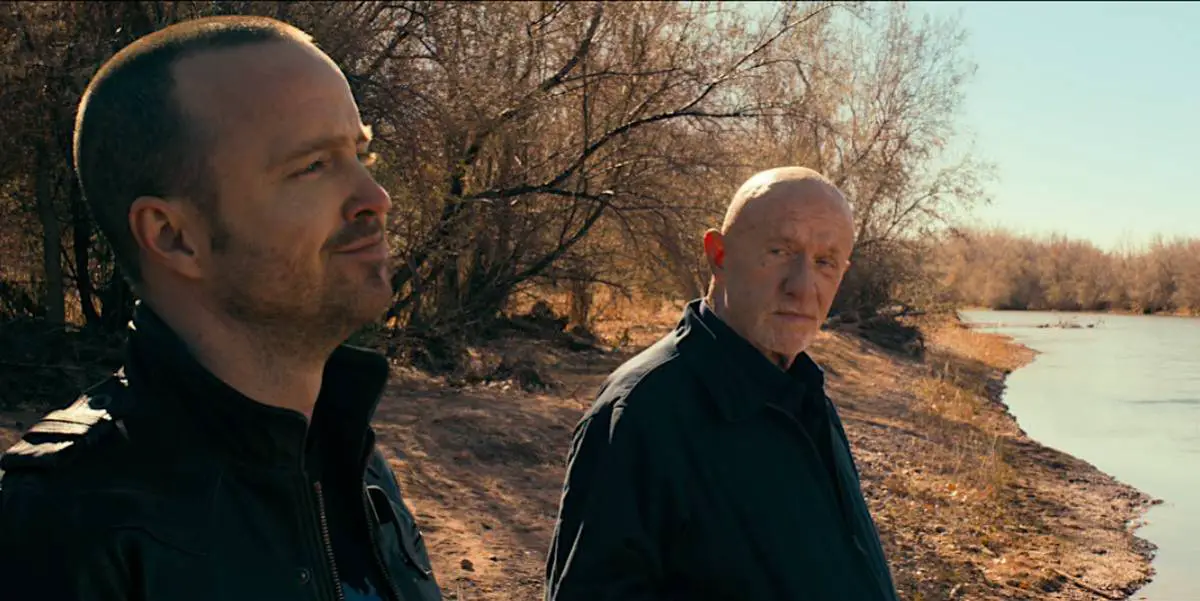
It’s what parts of the fandom have been desperate for since the show ended without giving us any sense of closure for Jesse. There are entire works of fanfiction dedicated to Jesse’s life in Alaska. It’s the ending we wanted for him, and we do eventually get it, but I am happy that El Camino is his journey to get there and not his new life as Mr. Driscoll. After the very first teaser trailer with Skinny being interrogated, I actively avoided any further trailers or interviews or anything that might have even hinted at what was to come in the movie. I didn’t want to know. I wanted to go in completely blind and see what fresh hell Vince Gilligan had in store for me. I’m happy I did it this way, not only because Gilligan never disappoints, but because had I believed in any way that the story was going to be Alaska-based and not Albuquerque-based, it would have dulled my enthusiasm a bit.
Some people believed that the movie would explore Jesse’s new life—a long-form treatment of the Better Call Saul snippets of Cinnabon Gene in Omaha—but I really was hoping for exactly what we got: what happened to Jesse immediately following the events of “Felina” and how the hell he makes it out of town to freedom. What I wasn’t expecting, but what absolutely made the movie for me, were the flashbacks that filled in blanks that I believe are necessary to tell the entire story of Jesse Pinkman. The Todd Alquist section of El Camino is far and away my favorite.
El Camino spends a decent chunk of its 2-hour runtime exploring the nature of Todd and Jesse’s relationship during his captivity. It’s been rocky between them (to say the least) ever since Todd killed the young Drew Sharp, but the dynamic between them as captor and captive is absolutely fascinating. The thing that makes Todd such an interesting and bone-chilling villain is that he is so incredibly unassuming. He’s got this whole soft-spoken, gentle, friendly façade going on—and Jesse Plemons is absolutely perfect in this role—and part of the reason for that is because he is actually a complete psychopath who we have seen kill and carry out horrible tasks with a complete lack of remorse or empathy. He will say he is sorry for things, but we never feel that he actually is; it feels like he is saying it because it’s what one should say, not because he actually means it.
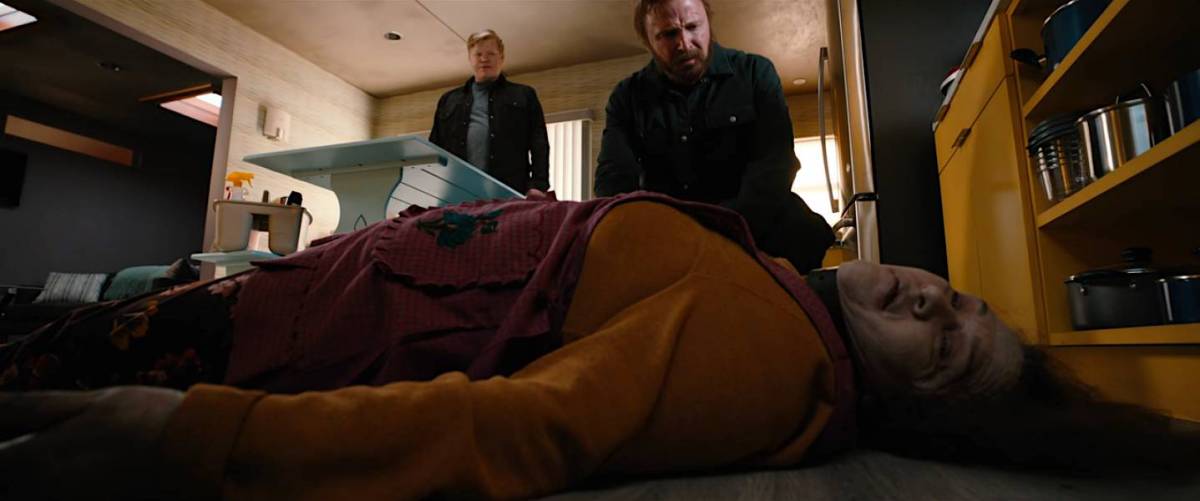
What is interesting about the scene we are presented with in El Camino is that Todd does sort of feel weirdly bad about killing his housekeeper. He’s not upset in any normal-person way, but for Todd it’s about as disturbed as he gets by his own actions. He knows that she didn’t deserve to die just because she found some of his hidden money, but Todd’s code of conduct states very clearly that anyone who poses even the slightest threat to him or his gang has got to die. There is no wiggle room, no gray area, no deals to be cut—they gotta go. So his poor innocent housekeeper lays dead on his kitchen floor, his belt wrapped around her neck, and he has enlisted Jesse to help him get rid of the body.
Jesse has no choice but to do whatever Todd tells him to do. Even though Uncle Jack and the rest of the gang are off waterskiing and Jesse would only have to get past Todd in order to free himself, he’s so completely beaten down and terrified at the prospect of Brock Cantillo inevitably paying for his sins, that he just goes along with it. For me, the highlight of the entire film is one of those darkly comic moments that Breaking Bad was always so good at: Todd driving out to the desert, singing along to the radio without a care in the world as Jesse lays in the back of the El Camino next to a dead body. It’s just so delightfully macabre that you have to laugh.
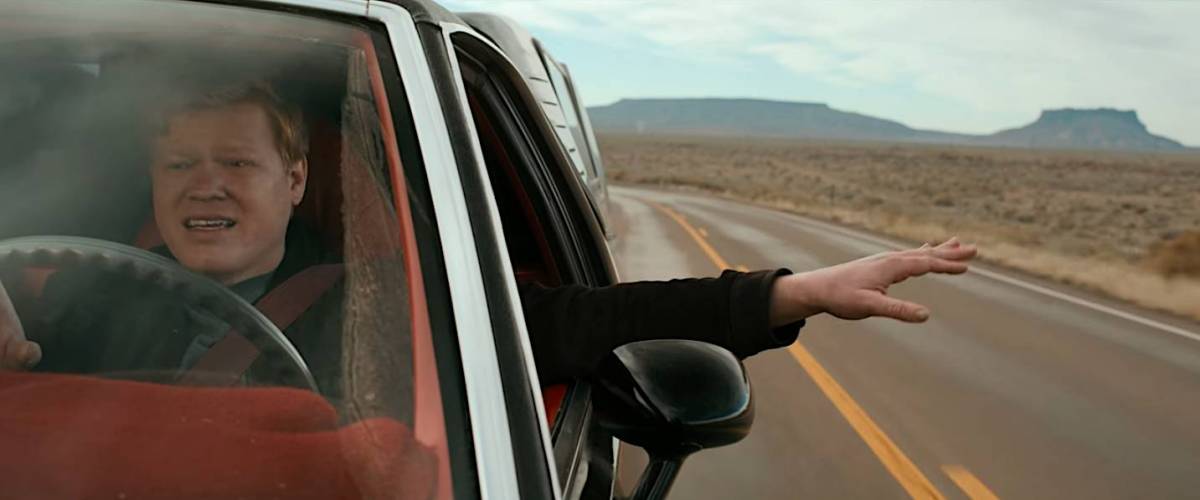
That moment breaks the tension that ramps back up again out in the desert as Jesse digs an unmarked grave for Todd’s housekeeper. Of course, because of the events of “Felina,” we know that Jesse does not escape during this little outing with Todd, yet El Camino still manages to create tension during the entire sequence, especially when Jesse gets a hold of Todd’s gun. We know he doesn’t shoot Todd; we know he doesn’t shoot himself, and yet I found myself actually believing that either of those things might actually happen. It’s a testament to Aaron Paul’s acting and Vince Gilligan’s storytelling that they can create a scenario in which I can actively ignore what I know to be true.
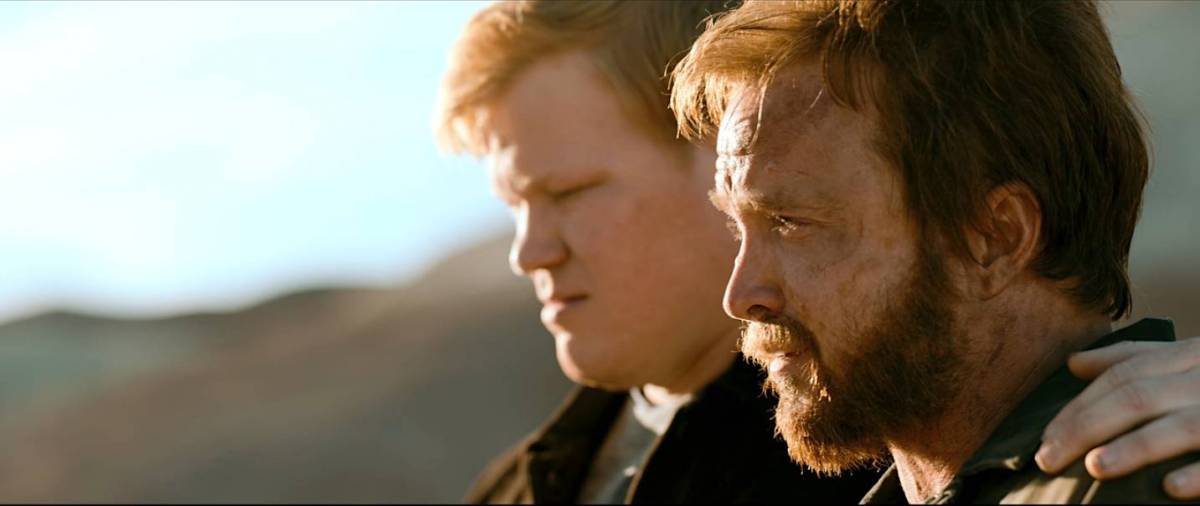
In addition to showing us the depth of Jesse’s misery during his captivity, the whole Todd sequence drives the present-day plot forward by giving Jesse a way out. If he can find Todd’s money, he’ll have enough to pay for his escape. But of course it’s not that simple. After the whole housekeeper incident, Todd moved his money stash and Jesse has to tear his place apart in order to locate it. When he finally does find it, hidden in a secret compartment in the refrigerator, two “cops” show up to search the place. As he states himself, Jesse is not a cop-killer. He would never harm innocent men just doing their jobs even if it meant sacrificing any chance at freedom. But lucky for Jesse, these are not innocent men.
No, these guys—Neil and Casey—are bad guys. We don’t learn exactly who they are or what their connection to Todd and the Nazis is until a bit later, but Jesse correctly assumes that their desire for Todd’s money (which they would never find without his help) will outweigh any urge to kill him. So Jesse makes off with one-third of Todd’s stash, and on his way out he finally recognizes Neil as the welder who rigged up the contraption that bound him in the meth lab (and was part of a little bet in which Jesse was basically tortured in order to see if the rig would hold).
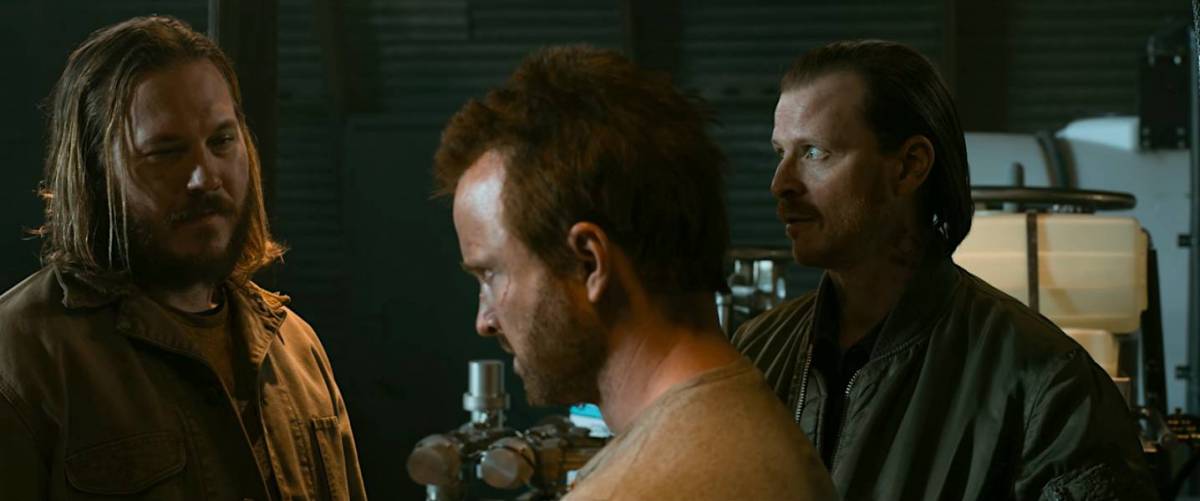
His money finally secured, Jesse takes a trip to Best Quality Vacuum to see Ed Galbraith (Robert Forster in what would sadly be his final role). Jesse had almost used Ed’s services once before but bailed at the last minute. Ed has not forgotten this, and he tells Jesse that he owes him for the last pickup in addition to his current needs. Jesse owes $250K but he’s $1,800 short and Ed is not one to break his rules. When Jesse refuses to leave, Ed calls the police and Jesse thinks he’s bluffing. I was almost convinced that Jesse was right about that, too, but he wasn’t and he runs off to plan his next move.
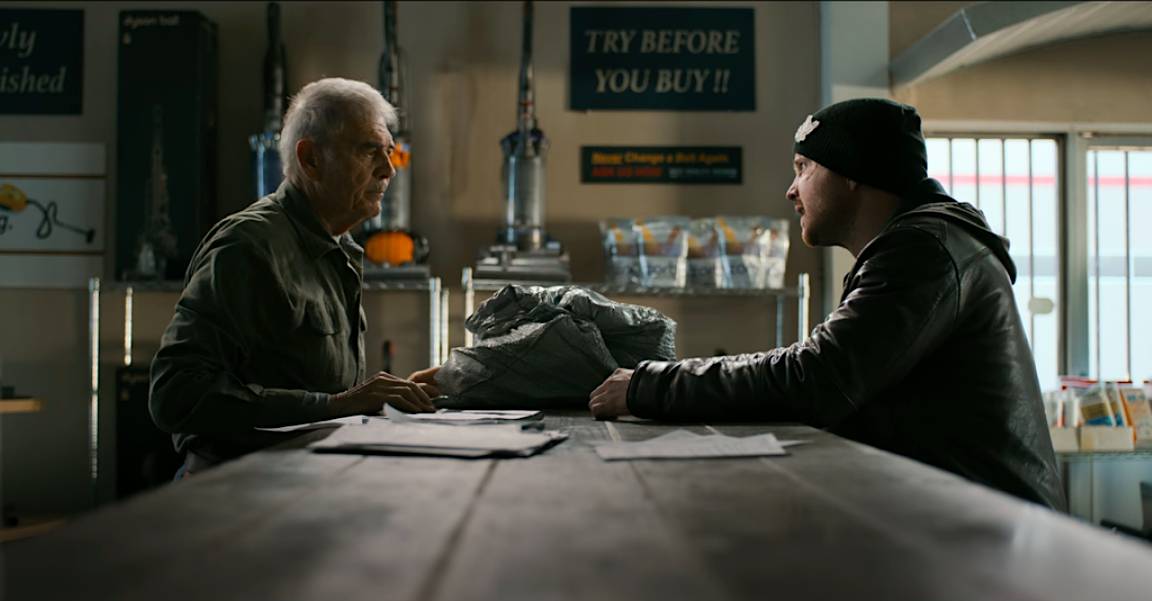
Before I continue I want to just state for the record that I always have and continue to hate Jesse’s parents. While I can understand that Jesse put them through hell, I truly believe that they did not do right by him. I was ecstatic when Jesse stuck it to them in the show by buying his aunt’s house back from them. And so, when he calls them up and apologizes to them, I wasn’t particularly feeling it. I’m not saying they don’t deserve an apology from him for a lot of things he did, but at the end of the day, they gave up on him and he suffered horribly for it. Maybe if he had parents who didn’t cut and run, he wouldn’t have sought out and stuck by the world’s most toxic father figure in Walter White. That said, Jesse is at the point where he is accepting that all his mistakes were his own, and if he feels like he needs to express that to his parents, then fine. I am and will always be a Jesse apologist, though, and while I’m not saying he didn’t make a long line of terrible choices, the vast majority of those choices were made because he had no one in his life to help him out from under the massive shitstorm that was Walt.
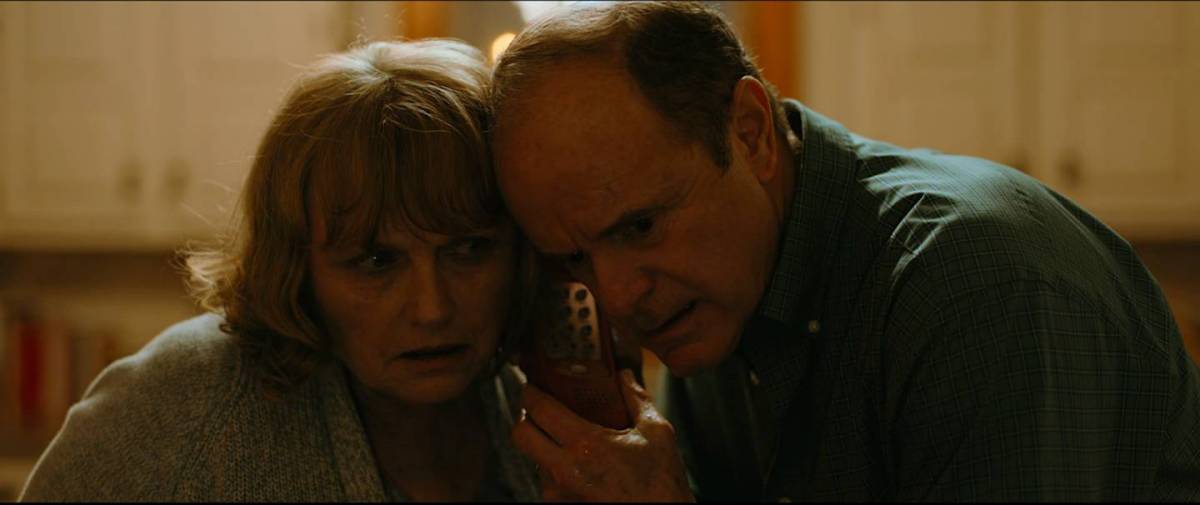
The next part of Jesse’s plan involved getting his parents out of the house under the guise that he’s ready to turn himself in. While I assumed he was there to steal enough money (in the form of his mom’s jewelry or some such thing) to get him to the $250K mark, he’s actually there for guns so he can go serve up some justice to Neil for what he did to him. While his main purpose is to get the rest of the money he needs, it’s especially cathartic to watch him take out the guy who contributed to his trauma. While I never actively root for Jesse to kill people, the fact that we’ve only just met these guys (who are clearly bad) and that Neil was a part of Jesse’s personal hell make it easy for me to be more than OK with it. Jesse blows up the welding shop for good measure, which reminded me of the total destruction of the Nazi compound. Walt was the one who got the satisfaction of killing all of Jesse’s captors (save Todd, who Jesse got to do himself), so this part is essentially Jesse’s way of (literally) burning it all down and leaving that part of himself in the ashes.
On my first viewing of El Camino, I was incredibly torn about the Walt flashback. We see Walt and Jesse together after their near-disastrous cook in “4 Days Out,” eating at a diner and discussing how to move all the product they just made. This is very early days for their business and Walt still thinks that he’s going to die soon—likely before they can sell all the meth they’ve just made. Jesse assures him that no matter what happens, he will make sure his family gets the money. This was a much simpler time compared to what was to come, and the scene does serve its purpose: it reminds us of how things were between Walt and Jesse towards the beginning, before everything became way bigger and more complicated than either of them could have imagined at that point. It also reminds us that Walt was always a dick (he assumes Jesse didn’t graduate from high school even though he was literally right there when he got his diploma).
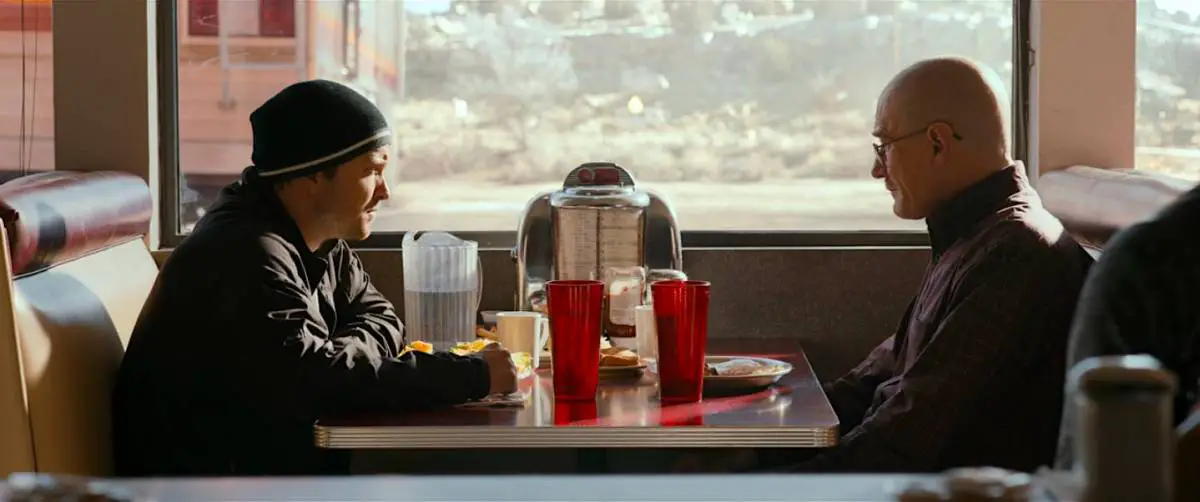
Still, it took me until after my second viewing of the movie to be fully OK with it. In my mind, El Camino is Jesse’s story. Breaking Bad as a whole was the story of many different people whose lives touched Walt’s, but at the end of the day it was Walt’s story. “Felina” was completely Walt’s story, and a fitting ending to his tale. But El Camino was supposed to be about Jesse, and to add Walt to the mix didn’t sit well with me initially. Walt (and Bryan Cranston as Walt) is such a presence and even a bit of a distraction, but the more I think about it, the more Walt had to be there, at least briefly (and I’m happy there was only one Walt flashback). Like it or not, Walt was a hugely important and impactful figure in Jesse’s life. Not only is Walt the reason Jesse finds himself in his current predicament, he is the reason that Jesse is free. To see Walt here, right before the end of the movie, is necessary to remind us that Walt was at times Jesse’s captor and, in the end, his liberator.
And he is liberated, finally. Jesse Pinkman makes it to Alaska with Ed’s help. He’s got a whole new identity and a new life ahead of him if he can manage to not screw it up. Jesse’s one last act as “Jesse Pinkman” is to have Ed deliver a letter to Brock Cantillo. While we don’t know exactly what he wrote to Brock, one has to assume that it is enough information to give him closure about what happened to his mother (and probably what happened to him with the whole being poisoned thing). The letter is Jesse’s final confession before he moves on and tries to start again, but like Mike said, he can never put it right. All he can do is tell Brock the truth in the hope that maybe he’ll be able to move on with his life knowing what really happened and why.
After assuring Ed that he’s got his new details memorized and giving him the letter, Jesse sets off in his truck to start his new life. At the very end, we see a flashback of Jesse with Jane, the love of his life, and we see a moment between them where she says that she needs to start making her own choices instead of going where the universe takes her. For Jesse, that time is now. Jesse Pinkman went where the universe took him. One can only hope that Mr. Driscoll will know better.
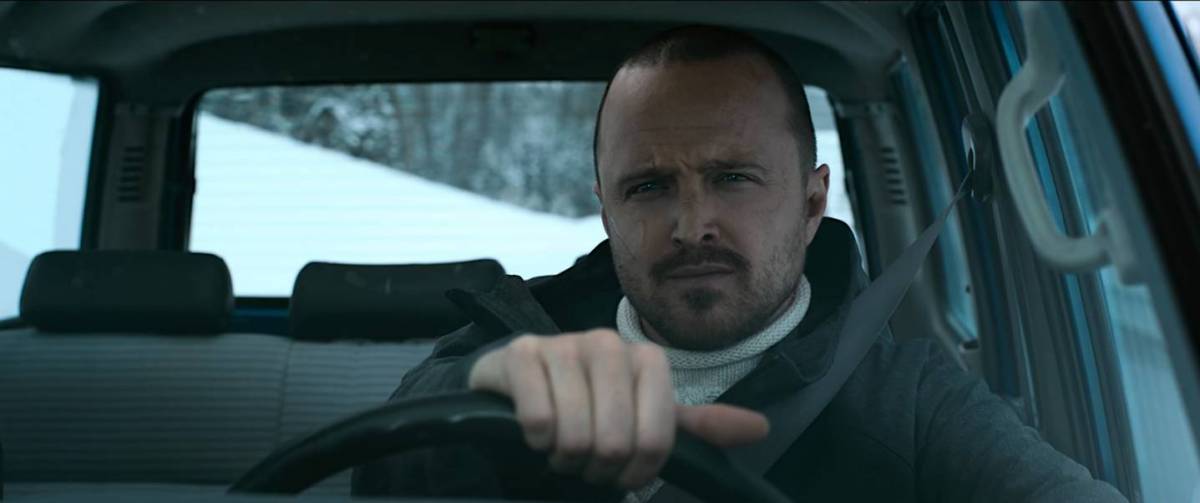
Where “Felina” gave us Jesse driving away like a maniac, El Camino ends with Jesse driving away looking content and hopeful. We don’t know what life as Mr. Driscoll will bring, but the ending asks us to be optimistic about his chances at making it. After all, he is still relatively young. What’s most important when thinking about whether or not Jesse deserves a happy ending is the fact that he’s always, every step of the way, been sorry for everything he’s done. He’s suffered for his actions and he regrets everything. So, should he get a second chance? Does he deserve that or is he too far gone at this point? I believe he does deserve it, and obviously so does Vince Gilligan because he gave us exactly that.



